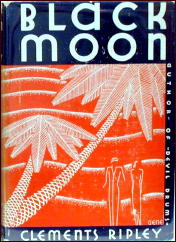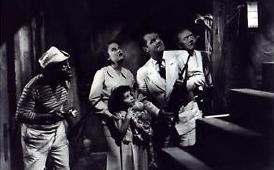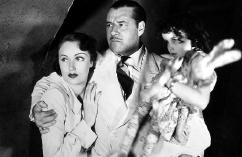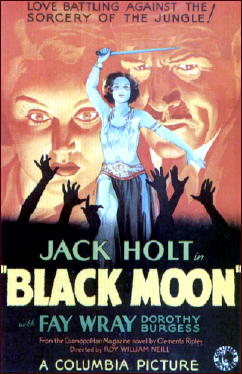Mon 4 Nov 2013
A Review by Dan Stumpf: BLACK MOON (Book and Film, 1933/1934).
Posted by Steve under Action Adventure movies , Reviews1 Comment
CLEMENTS RIPLEY – Black Moon. Harcourt Brace & Co, hardcover, 1933.

BLACK MOON. Columbia, 1934. Jack Holt, Fay Wray, Dorothy Burgess, Cora Sue Collins, Arnold Korff, Clarence Muse. Based on the novel by Clements Ripley. Director: Roy William Neill.
Clements Ripley’s Black Moon amounts to very little really, but it has its moments. Steven Lane is one of those wealthy, athletic, handsome and single young men who crop up regularly in adventure stories of that day, and as this one opens he’s on his way to an island somewhere south of Haiti to marry Amalia Perez, your typical fiery Latin beauty, who mysteriously returned to the tiny isle of her birth just as they were getting serious about each other back in New York.
Lane is barely past the first page when he gets a bit of foreshadowing from a cagey servant — a black man named “Lunch†whose depiction is regrettably condescending — and it’s not much later that he encounters Amalia’s uncle, Dr. Perez, who owns the island (and the people on it, he presumes) and looks over his niece’s interests with a solicitude bordering on the pathological.
Amalia herself appears not much later, but she seems so remote and disinterested that Lane wonders how serious they were about each other to begin with. Fortunately, there’s a perky level-headed young American girl around on the island and the veteran reader of this sort of thing can see their attraction coming several chapters before they do.

The plot develops apace, with unrest among the natives, sinister drums, mysterious disappearances and even more mysterious antics from the sultry Amalia, who turns out to be a High Priestess of the local Voodoo cult, bent on human sacrifice.
Well we’ve all dated girls like that from time to time, but oddly enough it is not Amalia who emerges as the villain of the piece but her uncle, the good doctor whose fine manners mask a control freak on the order of Count Zaroff, gradually spinning out of bounds as he countenances murder, cover-up and even cold-blooded savagery in the name of tradition and family pride—all with the suave graciousness one expects from baddies in pulp fiction.
And even more surprising, the racially stereotyped Lunch starts taking on more and more of the heroics, performing handy bits of business like chewing through ropes and even a bit of convenient killing that our nominal hero is just too decent a chap to commit. Before we get to the end, Ripley has treated us to a fine panoply of thrills, including capture by natives, murder on the garden path, black magic rites and a running gun battle across the island by hero and villain with the natives in hot pursuit of them both. Possibly not the most intelligent book you could pick, but undeniably lively.

Black Moon had the good fortune to be filmed by Roy William Neil at Columbia in 1934, and it’s really a crackerjack little film, handled by Neill – he of the Universal / Rathbone / Holmes movies — with his usual flair for atmosphere and pace. Dorothy Burgess plays the mysterious Latina, but as the film opens she’s already married to Lane, who has become a solid businessman, played by square-jawed and middle-aged Jack Holt.
But Burgess is yearning to return to the Caribbean island of her birth, and Holt lets her take their daughter and his secretary (Faye Wray) down there while he wraps up some business stateside, and in his absence things in the tropics go quickly hellward as Dorothy recalls her upbringing and realizes she was raised to be the priestess of a local voodoo cult – a destiny she will embrace even if it becomes the spark of a bloody religious uprising.
This has it all: steamy tropical suspense, bursts of action, and those incessant drums pounding-in-my-head-night-and-day-Oh-why-won’t-they-stop? Neill, who brought elegance to predestined piffle like Frankenstein Meets the Wolfman, directs with real feeling for the lurid essence of the material, and the result is a splendidly watchable little film I can highly recommend.
And though there’s no way to segue smoothly into this, I should add that Clarence Muse, one of the few minority performers of his day to consistently invest his roles with intelligence and dignity, brings real depth and feeling to the role of “Lunch†lifting the character out of the rut most black-servants-in-the-movies found themselves stuck in.

November 4th, 2013 at 1:34 am
My review of this movie was posted on this blog back in 2011. You can read it here:
https://mysteryfile.com/blog/?p=13915
I don’t seem to have liked it as much as Dan, but I don’t disagree with a word he says.